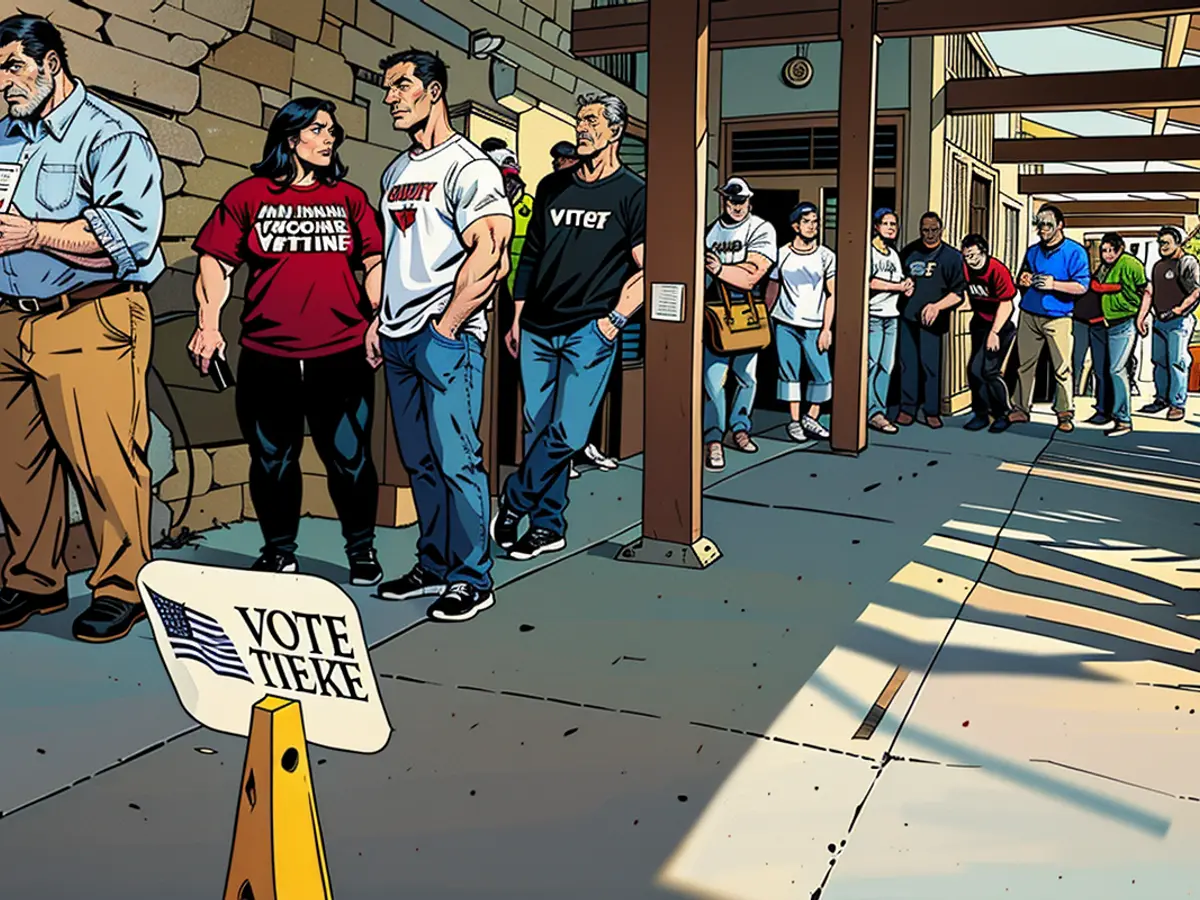'Integrity advocacy' organizations have constructed digital frameworks to gather alleged instances of voter fraud misconduct.
In a case, an individual labeled as a relief worker in disaster-stricken North Carolina shared a dire warning on VoteAlert.org, asserting that FEMA personnel handling hurricane damage were actually involved in a "ballot stuffing" scheme intended to sway the election. This claim allegedly involved FEMA utilizing donated supplies as a cover to transport absentee ballots using tractor trailers.
This tale of deception - soon debunked by local authorities - is simply one instance of a rising number of falsehoods spread through apps and websites launched by right-wing groups. Their purpose behind these platforms is to allow citizens to record suspected vote manipulations in the upcoming election.
However, many complaints featured on these public viewable platforms contain a lack of comprehension regarding election procedures or insufficient proof to support their claims. This was evident when governmental representatives reviewed these allegations at CNN's request.
Some of these organizations behind these new apps and websites boast a history of advocating elaborate theories concerning election fraud. One such group has lawsuits pending against nearly a dozen states to hinder election certification procedures, and includes on its legal team a lawyer who defended Donald Trump in his second impeachment trial, which challenged the result of the 2020 election.
MyPillow CEO Mike Lindell founded one social media app, while Steve Bannon's "War Room" show promotes another tipline. An app showcasing user-submitted claims of election improprieties across the US maps is operated by a group that cites the 2020 election as the catalyst for their increased activity. The pro-Trump super PAC, America PAC, launched an "Election Integrity Community" page on Elon Musk's platform, X, to collect potential instances of voter fraud or irregularities during the 2024 election.
Election watchdogs are concerned that this digital infrastructure could significantly enhance the speed and strategic reach of false information dissemination compared to 2020. Additionally, these tools could bolster activists in diverting local resources and potentially hindering voting at polling sites.
In Joanna Lydgate's words, President and CEO of States United Democracy Center, these apps and websites are part of an attempt to undermine public trust, causing chaos, and ultimately laying the groundwork to challenge or overturn election outcomes.
Hordes of amateur election monitors, fueled by years of misconceptions about voting insecurities, now stand prepared to submit complaints to central databases, which may later be used in post-election lawsuits.
“What transpired in 2020 was more of an improvised approach to undermining elections,” Lydgate concluded. The anti-democratic movement has evidently grown more sophisticated since then.
Questionable activity
One of the more popular projects is run by the conservative Texas-based nonprofit, True the Vote. In September, they encouraged followers to participate in election protection by using a new app called VoteAlert. Offering users the ability to report "suspicious" activity and browse other allegations on a platform resembling popular social media feeds, VoteAlert has already published numerous claims of election irregularities in various precincts across the nation.
For example, a VoteAlert user suggested recently that ballot theft occurred in Jefferson County, Colorado, based on a Ring video showing an individual peeking into a mailbox at midnight. However, as Jefferson County clerk Amanda Gonzalez clarified, her office is aware of this incident but has yet to discover any evidence of ballot theft. She also confirmed that any suspiciously stolen ballots would be invalidated due to non-matching signatures.
Another user reported allegations of voter registration fraud in Haines, Alaska, using a post office address as a residence. An operations manager with Alaska’s elections division, Michaela Thompson, subsequently dismissed these claims, stating no registered voters have that address listed as their residence.
A VoteAlert user from Henrico County, Virginia, filed a complaint about electioneering after spotting a large Kamala Harris tent nearby during voting. Anne Marie Middlesworth, Henrico County's deputy registrar, reported that the tent was situated beyond the required 40 feet from polling place doors, and both Democrats and Republicans had utilized tents at the location.
Skip the intermediary
True the Vote's founder, Catherine Engelbrecht, who has promoted various election conspiracy theories and helped organize mass challenges to voter registrations in the US this year, claimed her group aims to empower citizens to ensure fair elections. Engelbrecht, however, did not respond to a request for comment.
Local officials emphasized that instead of sharing information through apps, concerned citizens should directly approach the relevant authorities to report potential irregularities.
Frank Phillips, the election administrator for Denton County, Texas, suggested that citizens "cut out the middleman" and immediately report suspicious activities to authorities instead.
Phillips was the subject of a VoteAlert notification that implied he stated that individuals with "non-resident" IDs should be allowed to vote at polling stations. Phillips clarified that the alert misrepresented his earlier stance on temporary driver's licenses, and emphasized that Texas has a verification mechanism to ensure non-citizens are not enrolled as voters. "I never suggested that undocumented individuals could vote," he asserted.
The state issued a guidance earlier this month, advising voters against utilizing temporary driver's licenses to cast their ballots.
The questionable credibility of claims circulating on such platforms may not deter them from being utilized in post-election litigations or for political tactics, explained Alice Clapman, senior counsel with the Brennan Center for Justice's Voting Rights Program.
"Election deniers are utilizing technology to generate fabricated details that might appear as evidence, potentially, to the courts, to the public," said Clapman. "The strategy seems to be to generate such high volumes of false information that it becomes more difficult for journalists, for courts, for the general public to distinguish fact from fiction."
Although approximately 60 lawsuits filed by Trump's legal team and allies that challenged aspects of the 2020 election were dismissed or withdrawn, Trump continues to assert that he won that election.
“Rigorous analytical effort”
Recently, in an appearance on Bannon's "War Room" program, Marly Hornik, the founder of a new organization, showcased its new tool for reporting any suspicious activities at the polling stations.
Hornik urged listeners to access the new "election complaint" page on the group's website, where they could submit any potential violations they observed to the authorities. Hornik explained that users would be able to submit reports using only a few clicks and receive copies of their complaints that would be required to be sent to their state election officials, creating a trail of "evidence" that could be used in future litigations. The site also allows users to upload videos, photographs, and related documents, she noted.
Guest host Ben Harnwell, one of the stand-ins since Bannon went to federal prison in July to serve a 4-month sentence for contempt of Congress conviction, praised the concept as "inventive."
"We must do this if we love this country," stated Hornik. "If we truly want to win, we must conduct this rigorous analytical effort."
The website's rudimentary appearance would not look out of place on a local government site, except for the Uncle Sam icon and the phrase, "We require your help!" at the beginning of an instructional video. The form provides users with various options for reporting allegedly observed infractions, ranging from severe issues like the abrupt closure of a polling station to less severe concerns like prolonged queues.
The video's narrator explicitly mentioned that any complaints would become a part of the public record and might be utilized in future legal actions.
"They are, in fact, more overt than some of the other organizations about how they are collecting these incidents with the intention of filing post-election litigations, to block certification or dispute the results," said Emma Steiner, a researcher at the progressive watchdog group Documented who has traced the rise of self-proclaimed election integrity groups, such as United Sovereign Americans, since the 2020 election.
“Groundless legal arguments”
United Sovereign Americans has already demonstrated an aggressive legal strategy this election cycle. The organization has filed lawsuits in nine states to halt the certification of elections until authorities fulfill various demands, such as the revamp of the state voter lists, which they argue are riddled with errors. Among the group's attorneys is Bruce Castor, who represented former President Trump in his second impeachment trial before the US Senate in 2021.
Authorities in certain states have challenged some of the lawsuits' arguments. For instance, Ohio's Republican attorney general stated that one of the pending lawsuits seeks to "postpone the 2024 election" based on "unconvincing legal arguments."
In a statement to CNN, a spokesperson for United Sovereign Americans stated that the organization operates only as a "medium to facilitate citizens in following a legally valid process" and hopes that people also transmit their complaints to the authorities responsible for conducting investigations. The spokesperson added that the organization plans to file more lawsuits.
On its website, United Sovereign Americans asserts that it relies on donations to support its legal strategy. The group reported approximately $13,900 in cash reserves at the end of 2023, as per filings. A recent fundraising campaign on the group's site aimed to recruit 100,000 small-dollar contributors.
Regardless of the legitimacy of the claims from such groups, voting experts stress the strategy of using misinformation to sway public opinion in this election.
"It's not a matter of hypothetical speculation whether individuals will sow doubts," stated Clapman of the Brennan Center. "They are already sowing them, thus it is an all-hands-on-deck effort to disseminate precise information and ensure a peaceful transfer of power."
- The rise of false claims about election irregularities on apps like VoteAlert, promoted by groups such as True the Vote, is causing concern among election watchdogs, who believe these platforms could significantly enhance the speed and strategic reach of misinformation.
- In response to these concerns, local officials encourage citizens to report potential irregularities directly to them, rather than sharing information through apps, to ensure accurate information is used for investigations and post-election litigations.










